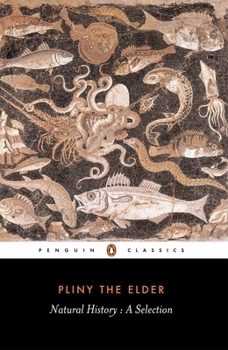Natural History: A Selection
Pliny's Natural History is an astonishingly ambitious work that ranges from astronomy to art and from geography to zoology. Mingling acute observation with often wild speculation, it offers a fascinating view of the world as it was understood in the first century AD, whether describing the danger of diving for sponges, the first water-clock, or the use of asses' milk to remove wrinkles. Pliny himself died while investigating the volcanic eruption...
Format:Paperback
Language:English
ISBN:0140444130
ISBN13:9780140444131
Release Date:December 1991
Publisher:Penguin Group
Length:448 Pages
Weight:0.65 lbs.
Dimensions:1.1" x 5.2" x 7.7"
Age Range:18 years and up
Grade Range:Postsecondary and higher
Customer Reviews
4 ratings
An ancestor of Borges, Kafka and Calvino
Published by Thriftbooks.com User , 18 years ago
It is ridiculous to dismiss Pliny on account of his many mistakes and factual errors and so on. The way to read this book is the way in which you read that kind of fantastic literature that gives the "illusion" of fact; Borges and Italo Calvino come to mind - the first one had plans for making an edition of Pliny in Spanish, with his prologue, but died before finishing the project (you can check the notes of Borges' Selected Non-Fictions for that); Calvino in fact wrote a wonderful essay on Pliny, included in "Why Read the Classics?", a book everyone giving "Natural History" less than four stars should read urgently. Let's say it: if Pliny had got everything "right", he would still be used to teach natural science in high-school... and, for that reason, nobody would care about him. There are people who think that the only documents that tell us something about the past are those written with a clinical, cold eye: the look of an outsider. This book is fun PRECISELY because Pliny wrote down everything that reached his ears without checking the facts -Zeus bless his heart-, and because of his welcoming disposition, a geography of the common imagination of that time has been preserved; something that otherwise would be lost. Not long ago some people around this parts believed the Russians ate their own children. A good number among us are certain that paying someone to listen to your problems for fifty minutes every week, allows you to confront your unearthed traumas and clean up your life. Maybe in a thousand years all this will be just the mythology of our time. A few days ago scientists started to suspect Pluto is not a planet after all, so all those books written about it in the past century... they are mutating already into vintage science fiction. In the meantime, how can anyone not be interested to know that "there is a record of 120 (mice) being born from a single mother, and in Persia of mice already pregnant being found in the parent's womb; and it is believed that they are made pregnant by tasting salt"(X, LXXXIV)? Or that "the day on which King Pyrrhus died, the heads of his victims, when cut off, crawled about licking up their own blood"(XI, LXXVII)? Or that "some people are born with a hairy heart, and that they are exceptionally brave and resolute. An example being a Messenian named Aristomenes who killed three thousand Spartans. He himself, when severely wounded, was taken prisoner and for the first time escaped through a cave from confinement in the quarries by following the routes by which foxes got in. He was again taken prisoner, but when his guards were fast asleep he role to the fire and burnt off his thongs, burning his body in the process. He was taken a third time, and the Spartans cut him open alive and his heart was found to be shaggy"(XI, LXIX)? How can anyone not enjoy fragments like this one: "The most learned authorities state that the eyes are connected with the brain by a vein; for my own part I am inclined t
How get he get so much wrong?
Published by Thriftbooks.com User , 21 years ago
This book was pretty good although I had to constantly check most of Pliny's 'facts' with a natural science textbook nearby. I was shocked to find how wrong he was and on so many things. Its like he was just guessing and not performing the necessary experiments. I don't know where this guy got his degree, but that place probably wants to rethink their ciriculum. Quite frankly, with Scientists has ill-informed as Pliny was, its amazing that the Roman Empire lasted so long. What else can you really say?
Great job, covering many of Pliny's best writing.
Published by Thriftbooks.com User , 25 years ago
This book has many of the best parts from the full version of Naturlis Historia, and is much easier to read than the 1000+ pages in the many volumes. Great if you don't the time for all of the volumes, or to find them all. This is a book well worth reading.
Pliny's Natural History
Published by Thriftbooks.com User , 26 years ago
Endlessly quotable (I quote it all the time) funny and humbling (just think what people will think of some of our scientific theories in 2000 years time). Travellers tales, myth, fantasy and science all jumbled up together.




